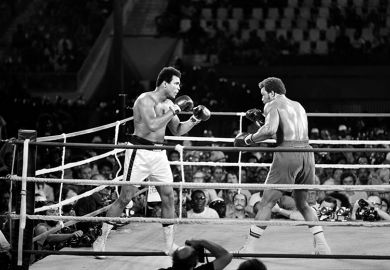Football is the most popular sport in the world. It delivers exciting dramas, emotional rollercoasters and life-long commitments. I remember perfectly the moment at Easter Road when my 5-year-old Hibernian-supporting son cried helplessly at the loss of an Edinburgh derby due to an 81st-minute Hearts goal, at which point I announced to my fellow season ticket holders that he had become a football fan. The game grips us and matters to us. The central aim of Stephen Mumford’s impressively insightful book is to help us see why that is, using the tools and methods of philosophy.
Some head-in-the-clouds sorts might wonder whether football is a fitting topic for philosophical analysis. But Mumford demonstrates that the beautiful game, a game which he clearly adores and about which he knows a great deal, is riddled with the kinds of questions that philosophers care about. These include questions about what ought to be done (to play the game “the right way”); about the relationship between parts and wholes (between the individual players and the team); and, of course, about precisely what makes it beautiful (or, alternatively, what aesthetic categories apply to football). In pursuing answers to questions such as these, Mumford’s strategy, for the most part, is to take carefully selected off-the-shelf positions in philosophy and apply them to football so as to reveal the deep character of the game. It is not, or anyway not primarily, to use football as a way of interrogating those philosophical views. This in no way represents a failure on the part of the book; it's simply its nature. And it certainly doesn’t mean that the book will be uninteresting to readers who are temperamentally focused on philosophy itself, since those off-the-shelf positions surely gain support precisely because they help us understand the phenomenon of football.
In truth, I may be an easy catch for this book, since, like Mumford, I am a philosopher who thinks that philosophy ought to deepen our appreciation of those aspects of life that people value, whatever those aspects may be. I am also an unapologetic football fan who has often marvelled at just how philosophically interesting the game is. Nevertheless, I really am inclined to believe that there must be something right about Hegel’s notoriously obscure philosophy if, as Mumford proposes, it illuminates the evolution of football tactics.
Inevitably, some of Mumford’s analyses are more compelling than others. Thus the final informal paradox that he identifies – roughly, that if one’s aim is to produce beauty in football (e.g. by show-off ball-juggling), one will necessarily fail to achieve it, while if one aims to win, one might create beauty – contains a powerful lesson. By contrast, his treatment of how space figures in football risks falling foul of that occasional bane of philosophy, the restating of the obvious in fancy language. But this is to quibble. There are an awful lot of football fans out there and there’s something about the sport that connects us in enthralling ways with our deepest aesthetic, moral and existential questions. This thoroughly engaging book undoubtedly helps us to understand that something.
Michael Wheeler is professor of philosophy at the University of Stirling.
Football: The Philosophy Behind the Game
By Stephen Mumford
Polity, 128pp, £35.00 and £9.99
ISBN 9781509535316 and 9781509535323
Published 5 April 2019
POSTSCRIPT:
Print headline: Values beyond the goalpost
Register to continue
Why register?
- Registration is free and only takes a moment
- Once registered, you can read 3 articles a month
- Sign up for our newsletter
Subscribe
Or subscribe for unlimited access to:
- Unlimited access to news, views, insights & reviews
- Digital editions
- Digital access to THE’s university and college rankings analysis
Already registered or a current subscriber?








